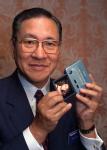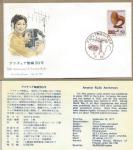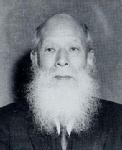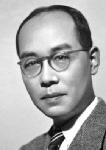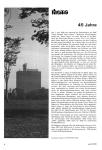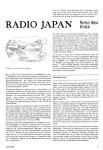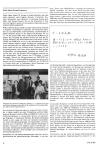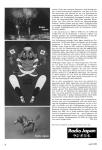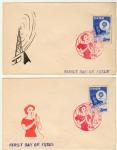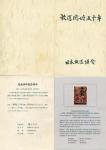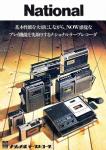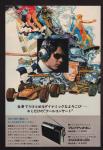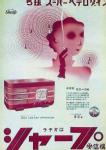
Information / Radiohistory for Japan

Beginning of Radio Broadcasting in Japan
Before the Broadcasting
Japan has a long history of researching wireless communication as well as its home production. Three years after the experiment on yield of current by Herz (1886), Hantaro Nagaoka made public experiment in spark discharge at The University of Tokyo(1889). Just after Marconi's wireless communication in 1887, research started for practical use by Electrotechnical Laboratory in Japan.
In 1899 began home products of wireless equipments. Thus wireless equipments realized excellent results at the Battle of the Japan Sea in 1914. After the WW I, wireless were used very often, not only for military use but also for marine use.
In 1914, with regard to this situation, the Wireless Law and the Reguration for Private Wireless Telegraph were enacted.
In 1920, KDKA Station in U.S.A. started world first broadcasting. Also in Japan research on broadcasting became much popular, and various experiments were extensively carried on. Consequentry many technical books, eriodicals and magazines were published. By confusion of the Kanto Earthquake Disaster in 1923, information routes were cut off. But ships anchored in Tokyo Bay gave the most effective results communicating by wireless. Consequently public opinion were aroused for realization of broadcasting.
Beginning of Broadcasting
In the next year after the Earthquake, applications for establishing broadcasting station were estimated to reach 64 throughout the land. But Japanese government set limits and sanctioned the establishment of broadcasting stations running by public utilities corporations in three great cities, Tokyo, Osaka, Nagoya. In 1924, Tokyo Broadcasting Station (JOAK), in 1925 Osaka Broadcasting Station (JOBK) and Nagoya Broadcasting Station (JOCK) were established. All of them were corporation aggregates. On 22 March, 1925, radio broadcasting started provisionally from Shibaura Broadcasting Station in Tokyo, which was the beginning of Japanese history of radio broadcasting. Only 5 years behind the world first broadcast in U.S.A. Although the number of listeners of was no more than 5,455 at that time, it jumped to 390,000 by 1926.
Radios at the beginning of broadcasting
Under the ordinance the Regulation for Private Wireless Telephone promulgated in 1923 just before the beginning of broadcasting, radios were admitted as obtained sanction from the Communication Ministry. Technical standard was set on the basis of the ordinance "The Regulation for Electrical Appliance", Article 4 of the Communication Ministry issued in 1916, and it is decided that the wave length must be confined within 200-250m or 250-400m, besides radio waves must be without generation from antenna. Whoever passed examination acquired "The Type Approval" and could indicate passing number as well as type approval stamp (created in 1924). As for approved receivers, wave-length selector was required, and besides generation of radio wave was permitted. Thus, regenerative detector could not be used, the sensitivity was low, therefore expensive. But in reality, lots of imported and hand-made radios not always following such ruled ware used.
On 18 April, 1925 just after the beginning of broadcasting, Ordinance No.23 of the Communication Ministry was issued, which abolished selector of wave length and limited wave length less than 400m. In addition to it, permission for listening was given to non approved radios. Accordingly, type approval system became nominal. After Ordinance No.71 of October 1925 now on, no more than examination was carried on. Through 1924 into 1925 type approval was given to 64 varieties of radios and parts, of which from No.2 to No.71 (No. 1,6,1,12,13,35,36 missing) are in existence. Makers of communicating equipment such as Annaka and Shibaura which had produced lots of approved receivers withdrew from radio industry several years after the beginning of broadcasting. 70% of Japanese radios at that time were crystal type listening worth receivers. Battery operated tube radios using loud speaker system were not only expensive but also had to equip three types (A, B, C) of battery, especially by using Lead-acid battery for "A" lighting filament, the work required much time to charging.
Consequently not of public use. Japan introduced technique and appliances of radios from U.S.A. At first triode tube UV-201 ware used. Later, 201-A type with filament current reduced by half or power economized type 199 were used. As the result of that, A type battery could be changed from Lead-acid battery to dry battery. Therefore, since about 1924 much of radio sets have contained batteries inside.
|
Hits: 43367 Replies: 15
JAPAN 757
|
|
|
Mario Coelho
18.Nov.08 |
1
Dear Friends Some days ago a friend gave me a portable transistor radio set. Muxima, Model 412N I guess that it was bought in Angola, several years ago. MUXIMA means heart in "Kimbundu" , the old Angola's dialect.. This radio was made in Japan, or in Angola by license of a Japanese maker. That's what I've infered from the reference graved in its plastic box. But that reference is unusual. JAPAN 757. Also the manufacturer's name is missed. Do you know what 757 means? Have you seen any Japanese reference look like this one? 757 may be the manufacturer's code? Thank you in advance for any information. Regards Mario Coelho |
|
Ernst Erb
22.Jan.09 |
2
Dear Mario I would like to ask you to open the back lid of the radio and if you can find some I never know a manufacture's list to show which number is which maker. regards. |
|
Yutaka Matsuzaka
25.Jan.09 |
3
Dear OMs, Sorry,I can not identify the radio manufacture from the pictures though all parts installed on the board are clealy made in Japan. The words TAKADA MUSEN on the IFT shows manufacture's name' of this IFT in that period and Japanese MUSEN means 'wireless' like Yaesu Musen. I'll send the URL to some Japanese who have the webs for the antique radios to be identified the radio manufacture.The results will be sent to this page soon. So, it would need more times to get additional infomations on this matter. Thank you. regards, Y.Matsuzaka--JA1ATL |
|
José Manuel Silvestre
26.Feb.09 |
4
Dears Friends As information, I present two transistor radios sets recently gotten in Portuguese flea markets. The references engraved in the plastic box of the follow one, in my opinion, show indubitably that "Tokiwa Electrical Industries Co. Ltd" is the 725 Japanese maker. The other follow one, similary to the "Muxima" radio set, show that the 517 Japanese maker manufactured the 655 model radio set to the "Royal" Germany brand. With this information, I hoope to help on to a good decision about upload the models of Japanese Manufacturer's 757, 725, 517. Best Regards Silvestre |
|
Mario Coelho
09.Mar.09 |
5
Thank you very much Silvestre for your help. Now we have alredy three numbers from a list. That list ought to exist.
Unfortunately, after all these days we haven't yet that list from Japan. Nevertheless we have three identification numbers which correspond to three Japanese makers. For one of them we know a name : Tokiwa Electrical Industries Co. Ltd. I think that if you wish, you may create : "Tokiwa Electrical Industries Co. Ltd". (Japan 725). as a new maker in Rmorg. But we don't know yet the name of the other two makers,though we know their identification numbers. No doubt about that numbers. I wonder if may we cause any inconvenience to open in Rmorg temporary the other two makers as “Japan 517” and “Japan 757” till the day we may get the Japanese list? Regards Mario Meanwhile I found another code number Japan 304 in a RINSING set model BP-815 (waiting for acceptance in Rmorg pages). More: Meanwhile I've found in Rmorg three transistor radios JT-602 . Two of them are Orion and one is Belson brand.
By the way , I've one Orion with the same (model number?) JT-602..... But this model number (if it is for sure the model number ) is a little larger : JT-602 JAPAN But, If one pay attention, inside, on the chassis, is TR -108 D2 Questions: Could Orion and Belson sets be made in the same factory ? Then JT-602 JAPAN should be their code number and TR -108 D2 should be this Orion Model number. I put the same questions when I see this code number JT-602 also in a very different radio in this site: http://www.geocities.com/SoHo/Atrium/1031/trans/cool/Signal.html
|
|
Holger Ortmann
28.Apr.09 |
6
Ernst Erb May 9, 2011 (for Holger Ormann and others): with japanese Transistors..... ITT Schaub Lorenz SL 50, SL52, SL55, Studiorecorder 60, 70, 72, RC 1000, etc.. Neckermann Luxus Cassette recoder 823/147 with No. 515 on the Botton An Universum (Quelle) Order Nr 02729 RadioRecorder japanese manufactured with the Number 718 on the Botton Sometimes the Criterium of Japan manufactures are the ORDER NUMBER on the PRINTED CIRCUIT BOARD, not the Number on the Cover ! Not the GCMK Number on the P.C.Board FUNAI Videorecorder VCR 4000, VCR 4500 Videorecorder FUNAI with the CVC Cassette,Typenumber unknown The nearly same Recorders named Grundig VP 100, Siemens FM 500, Technicolor CVC, Universum CVC RecorderType unknown. Sets named with a German Brandname,but made by Funai: Tape Deck Telefunken RC 100, RC 200,Blaupunkt XC 240, Siemens RC 333, Uher CG 344, Universum Tapedecks Hifi 6000, Hifi 6600, Universum CT2307 and many others. On all this Sets have P.C.Boards with a 7 x Number, beginning with 161.... Service Technican said, the really Manufactor is Funai Japan (for Telefunken RC200, Universum Hifi6600, Uher CG344 etc) Only in very old Funai Sets are this Kind of Number of the Boards. Second Example +++ CROWN Radio Corporation +++ There stand on the P.C.Board A M B ...and a 3 x Number. Example Mini TV CROWN CTV-12 and Universum FK100 (FK 100). Below, Wolfgang Scheida began the list, Holger Ortmann did propose and Wolfgang Scheida and I will continue to fill this list - if we receive findings from you - please also photograph your findings and put htem to the model page.
Mario Coelho:
Why one can see JAPAN + a code number, only on this "Strange" brandnamestypes? |
|
Ernst Erb
28.Apr.09 |
7
We list a product there where a collector looks for. In most cases this is the country of production and sales. In later years production was outsourced. In that case: If there are differencies on a set AND it is also sold/advertised in that country of origin then we may open a new brand/manufacturer name for that country. We may have some problems with this in certain cases like for Grundig which brand was sold to a company in Turkey. See model 75TE which is listed in Germany and in Turkey by good reasons. You just have to look at the back wall the different origins - both for export ... Grundig had also its works in England and you find schematics etc. in the UK. Some models then are naturally also found twice, like the model 2035... in Germany and the UK. |
|
Wolfgang Scheida
17.May.09 |
8
Japanese Radio Manufacturers Codes See below all used codes as well already known manufacturers: If you have more informations please write to the platform operator - Thanks! Japan 101 = AIWA Japan 403 = Koyo Denki, see 8 Transistor 2 Band KTR-834, Six Tr. de Luxe and Ross RE-1942 Japan 501 = Singer Solid State FM/AM Cassette HE-6030 Japan 501. Japan 601 = Emerson 31P56 Japan 609 = Ferguson Radio Corp. Ltd. London, Model 3160 Japan 611 = Midnight Owl WACO , WACO Rolls Royce 1910 Japan 710 = Toshiba (see Model 7H-896F) Japan 803 = Arrow Japan 902 = Captain YT-981 probably made by Yashima Electric EE March 16, 2011 Sep 13, 2012 = changed a dead outbound link. BN January 15, 2019, added new Miti no. 712 (Desesco) and 715 (Weltron), added proof for 206, now assigned to Funai, 303 for Hitachi and 403 for Koyo Denki. Thanks to Miguel Bravo for this input! |
|
Ernst Erb
29.Mar.11 |
9
This thread has grown too long and I have tried to delete some posts without loosing information.
I have received different theories - but not yet an evidence:
We still miss an official document, proving that MITI stands behind this - but it is most probable. We don't know if the code was given for a certain product line, a company, a group - but by collecting those numbers over a longer period we might find out. |
|
Konrad Birkner † 12.08.2014
18.May.11 |
10
Dear Mario, dear all, I strongly recommend to mention such code not only in the remarks. It is even more useful in either one of the two searchable fields: Model name or Model type. The latter I would prefer. The entry shhould be in brackets (Japan XXX) That permits to search for a listing of all models being manufactured by the quoted manufacturer, regardless under whatever name it was marketed. Such a search must ignore the country and manufacturer to be entered. Only the model field would see (Japan XXX). Note:
I prepared a model sheet for your "Muxima" to show what I mean. Please complete it with all available data/ info. |
|
Gidi Verheijen
24.Aug.13 |
11
Very recently I contacted METI (formerly MITI) in Japan to ask them for information about the codes for radio manufacturers and to send me the complete and accurate list. They answered me that they were not aware of any list with code numbers for radio manufacturers, but nevertheless they will try to find more information. |
|
Ernst Erb
26.Feb.18 |
12
Dear David At least I don't know the system and we try to get facts, but have never found a real list. Maybe it is all in Japanese. I add your model to code 704, because only if we can match a lot of models and link to "both sides" we might get a better picture later. Best would naturally be if somebody comes up with that official list. Even then it would be of interest which models were built under which Japan code. You might add to the model that we believe it is built by Sanyo for code 704. April 10, 2018: I entered all into post 8 what came after this and above and deleted the entries of David Erali, Martin Kent and Holger Ortmann with quite a few "connections"! Rhanks! This then forces to write a new post, so that i can fill in into the list because of the automatic message of the server I asked for. Thank you very much that you have entered your knowledge also to the models and made links. Perfect! |
|
Bernhard Nagel
04.Jun.18 |
13
Update: An example has been added for Japan 502, Matsushita (Panasonic, National) in post #8 and linked to the model. Also "big players" such as the company Matsushita was therefore assigned a Miti code. |
|
David Erali
05.Jun.18 |
14
I have made a spreadsheet to sort codes by number and also by brand. I have omitted specific models since there are too many. PDF files are attached. Please let me know if there are any comments or corrections. We have little info regarding the manufacturers. A few new models as follows: Airline GEN-1329A has code 705. RCA RJG-15Y has code 703 Commodore TW-88 has code 205 Valiant TR-1508 has code 903 Juliette MPR-3307 has code 707 RCA RZM 178T has code 302 RCA RZM 188E has code 302 RCA RZM 193 has code 705 Lloyds 6K89D has code 713 Masterwork 10 has code 708 Bradford WTG-89094 has code 501 Bradford WTG-60715 has code 501 Midland 10-405 has code 902 Alaron B-2500 has code 903 Attachments
|
|
Bernhard Nagel
10.Oct.18 |
15
Most probably Tokai Wireless Co. Ltd. can be allocated to the Miti Code 513, interestingly models branded with Tokai itself doesn't show this code. However, the sub-brand Life Tone (and also some models distibuted by Neckermann Versand, Germany) show it. The entry for Miti 513 in post #8 has been edited with a new link. Also added: Japan 716, found at model Wien Sport 9 Transistor and a Realtone branded model. |
|
Ernst Erb
14.Oct.19 |
16
To know much more about the Japan code please read this very informative and well researched article by David Erali (USA). If you know more please address to David by using either "Mail to the author" on a post of him as a member or as a guest using "Contact" as the bottom link on each of our pages.
|
End of forum contributions about this country
| Data Compliance | More Information |
